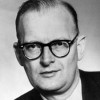There are two kinds of clocks. There is the clock that is always wrong, and that knows it is wrong, and glories in it; and there is the clock that is always right — except when you rely upon it, and then it is more wrong than you would think a clock could be in a civilized country.
Jerome K. Jerome (1859-1927) English writer, humorist [Jerome Klapka Jerome]
“Clocks,” Diary of a Pilgrimage, and Six Other Essays (1891)
(Source)
Quotations about:
technology
Note not all quotations have been tagged, so Search may find additional quotes on this topic.
I’ve come up with a set of rules that describe our reactions to technologies:
1. Anything that is in the world when you’re born is normal and ordinary and is just a natural part of the way the world works.
2. Anything that’s invented between when you’re fifteen and thirty-five is new and exciting and revolutionary and you can probably get a career in it.
3. Anything invented after you’re thirty-five is against the natural order of things.
The great question for our time is, how to make sure that the continuing scientific revolution brings benefits to everybody rather than widening the gap between rich and poor. To lift up poor countries, and poor people in rich countries, from poverty, to give them a chance of a decent life, technology is not enough. Technology must be guided and driven by ethics if it is to do more than provide new toys for the rich.
Freeman Dyson (1923-2020) English-American theoretical physicist, mathematician, futurist
“Progress in Religion,” Templeton Prize acceptance speech, Washington National Cathedral (9 May 2000)
(Source)
The invention of gunpowder and the constant improvement of firearms are enough in themselves to show that the advance of civilization has done nothing practical to alter or deflect the impulse to destroy the enemy, which is central to the very idea of war.
[Die Erfindung des Pulvers, die immer weiter gehende Ausbildung des Feuergewehrs zeigen schon hinreichend, dase die in dem Begriff des Krieges liegende Tendenz zur Vernichtung des Gegners auch faktisch durch die zunehmende Bildung keineswegs gestört oder abgelenkt worden ist.]
Karl von Clausewitz (1780-1831) Prussian soldier, historian, military theorist
On War [Vom Kriege], Book 1, ch. 1 “What Is War? [Was ist der Krieg?],” § 3 (1.1.3) (1832) [tr. Howard & Paret (1976)]
(Source)
(Source (German)). Alternate translations:The invention of gunpowder, the constant progress of improvements in the construction of firearms are sufficient proofs that the tendency to destroy the adversary which lies at the bottom of the conception of war, is in no way changed or modified through the progress of civilisation.
[tr. Graham (1873)]The invention of gunpowder and the advances continually being made in the development of firearms, in themselves show clearly enough that the demand for the destruction of the enemy, inherent in the theoretical conception of war, has been in no way actually weakened or diverted by the advance of civilization
[tr. Jolles (1943)]
The technologies which have had the most profound effects on human life are usually simple. A good example of a simple technology with profound historical consequences is hay. Nobody knows who invented hay, the idea of cutting grass in the autumn and storing it in large enough quantities to keep horses and cows alive through the winter. All we know is that the technology of hay was unknown to the Roman Empire but was known to every village of medieval Europe. Like many other crucially important technologies, hay emerged anonymously during the so-called Dark Ages. According to the Hay Theory of History, the invention of hay was the decisive event which moved the center of gravity of urban civilization from the Mediterranean basin to Northern and Western Europe. The Roman Empire did not need hay because in a Mediterranean climate the grass grows well enough in winter for animals to graze. North of the Alps, great cities dependent on horses and oxen for motive power could not exist without hay. So it was hay that allowed populations to grow and civilizations to flourish among the forests of Northern Europe. Hay moved the greatness of Rome to Paris and London, and later to Berlin and Moscow and New York.
Civilization, a much abused word, stands for a high matter quite apart from telephones and electric lights. It is a matter of imponderables, of delight in the things of the mind, of love of beauty, of honor, grace, courtesy, delicate feeling.
Edith Hamilton (1867-1963) American educator, author, classicist
The Greek Way, ch. 6 (1930)
(Source)
If we had a reliable way to label our toys good and bad, it would be easy to regulate technology wisely. But we can rarely see far enough ahead to know which road leads to damnation. Whoever concerns himself with big technology, either to push it forward or to stop it, is gambling in human lives.
Freeman Dyson (1923-2020) English-American theoretical physicist, mathematician, futurist
Disturbing the Universe, ch. 1 (1979)
(Source)
Technological advance is rapid. But without progress in charity, technological advance is useless. Indeed, it is worse than useless. Technological progress has merely provided us with more efficient means for going backwards.
Aldous Huxley (1894-1963) English novelist, essayist and critic
Ends and Means: An Inquiry Into the Nature of Ideals, ch. 1 (1937)
(Source)
Users do not care about what is inside the box, as long as the box does what they need done.
Jef Raskin (1943-2005) American computer scientist, writer
The Humane Interface, 1-5 (2000)
(Source)
Because we are the cause of our environmental problems, we are the ones in control of them, and we can choose or not choose to stop causing them and start solving them. The future is up for grabs, lying in our own hands. We don’t need new technologies to solve our problems; while new technologies can make some contribution, for the most part we “just” need the political will to apply solutions already available.
Jared Diamond (b. 1937) American geographer, historian, ornithologist, author
Collapse: How Societies Choose to Fail or Succeed, Part 4, ch. 16 (2005)
(Source)
I do so wish sometimes, that I could just pop home for an hour or two as easily in the flesh as in the spirit. No doubt the explorers of 2015, if there is anything left to explore, will not only carry their pocket wireless telephones fitted with wireless telescopes but will also receive their nourishment and warmth by wireless means & also their power to drive their motor sledges, but, of course, there will be an aerial daily excursion to both Poles then & it will be the bottom of the Atlantic, if not the centre of the earth, that will form the goal in those days.
Thomas Orde-Lees (1877-1948) British naval officer, arctic explorer, mountaineer, writer
Diary, aboard HMS Endurance (1915-01-10)
Written while the ship was trapped in the ice during Ernest Shackleton's ill-fated Imperial Trans-Antarctic Expedition. Some versions of the quotation refer to "2012," rather than 2015.
While the reference to "pocket wireless telephones" makes this quotation suspect, Orde-Lees has extensive diary material published, and this appears to be genuine.
The test of a democracy is not the magnificence of buildings or the speed of automobiles or the efficiency of air transportation, but rather the care given to the welfare of all the people.
Any sufficiently advanced magic is indistinguishable from technology.
Charles "Charlie" Stross (b. 1964) British writer
The Nightmare Stacks, ch. 18 (2016)
(Source)
A variant of Clarke's Third Law.
As the man put it: Any sufficiently advanced technology is indistinguishable from magic. Any sufficiently advanced alien intelligence is indistinguishable from God — the angry monotheistic sadist subtype. And the elder ones … aren’t friendly. (See? I told you I’d rather be an atheist!)
A common issue with SF settings is that causally disconnected civilizations nevertheless are close enough in technological development that conflict is possible, rather than it being a matter of laser cannons against a thin film of single celled organisms.
James Nicoll (b. 1961) Canadian reviewer, editor
“Because My Tears are Delicious to You 5,” rec.arts.sf.written, Usenet (30 Jun 2014)
(Source)
It demonstrated that old adage: never bring a gun to a fight where the other guy has a time-machine and tomorrow’s newspapers.
James Nicoll (b. 1961) Canadian reviewer, editor
“OTT: If ye break faith with us who die,” rec.arts.sf.written, Usenet (27 Apr 2006)
(Source)
It’s important to remember that the relationship between different media tends to be complementary. When new media arrive they don’t necessarily replace or eradicate previous types. Though we should perhaps observe a half second silence for the eight-track. — There that’s done. What usually happens is that older media have to shuffle about a bit to make space for the new one and its particular advantages. Radio did not kill books and television did not kill radio or movies — what television did kill was the cinema newsreel.
The means by which we live have outdistanced the ends for which we live. Our scientific power has outrun our spiritual power. We have guided missiles and misguided men.
Martin Luther King, Jr. (1929-1968) American clergyman, civil rights leader, social activist, preacher
Strength to Love, ch. 7 “The Man Who Was a Fool,” sec. 3 (1963)
(Source)
For a successful technology, reality must take precedence over public relations, for nature cannot be fooled.
Richard Feynman (1918-1988) American physicist
Rogers Commission Report into the Challenger Crash, Appendix F “Personal Observations on Reliability of Shuttle” (Jun 1986)
Full report
It is my heart-warm and world-embracing Christmas hope and aspiration that all of us — the high, the low, the rich, the poor, the admired, the despised, the loved, the hated, the civilized, the savage — may eventually be gathered together in a heaven of everlasting rest and peace and bliss — except the inventor of the telephone.
Mark Twain (1835-1910) American writer [pseud. of Samuel Clemens]
Letter to the Editor of the New York World (23 Dec 1890)
(Source)
The way of the portable computer user is as a stony path strewn with plugs and sockets, all the wrong size.
HOBBES: A new decade is coming up.
CALVIN: Yeah, big deal! Hmph. Where are the flying cars? Where are the Moon colonies? Where are the personal robots and the zero gravity boots, huh? You call this a new decade?! You call this the future?? Ha! Where are the rocket packs? Where are the disintegration rays? Where are the floating cities?
HOBBES: Frankly, I’m not sure people have the brains to manage the technology they’ve got.
CALVIN: I mean, look at this! We still have the weather?! Give me a break!
If the automobile had followed the same development cycle as the computer, a Rolls-Royce would today cost $100, get a million miles per gallon, and explode once a year, killing everyone inside.
Robert X. Cringely (contemp.) American technology columnist [pseud. for Mark Stephens and others]
“Notes from the Field,” InfoWorld (6 Mar 1989)





















